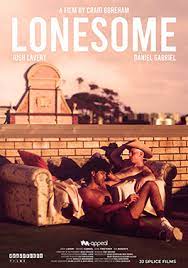
LONESOME
Australia, 2022, 95 minutes, Colour.
Josh Lavery, Daniel Gabriel, Annie Finsterer, Ian Roberts.
Directed by Craig Boreham.
An Australian cinema perspective on gay men and gay issues. Attitudes have changed over the last 50 years but gay men, many experiencing this in their teens, have encountered ignorance, being disowned by families and their communities, condemnation, often from a religious standpoint. This film dramatises these issues.
The government classification office indicates that this is considered Restricted material, more from the treatment of the themes rather than the issues themselves.
The treatment is Frank and explicit, especially in the first 20 minutes, sexual activity, hedonistic activity in chance encounters. Some audiences may have difficulty with the male body, cinema traditions restricting depictions making it is still something of a to boo. It is not to boo in Lonesome.
Clearly, Lonesome is a film for the gay community. But it offers a story, not necessarily new or unfamiliar, of a young man, initial experience in the New South Wales country town, a relationship with a married man, denunciation, disowned by his father, having to leave home, arriving in Sydney.
The initial impression is his contacts and sex. This is aided by social media, dating sites and rendezvous sites, like Grindr.
An encounter introduces him to a young man, Tib, who allows him to stay in his unit, share some jobs, carrying furniture, gardening work. The sexual activity leads to something of a relationship, some happy moments at the beach, but misunderstandings, clashes. And Casey, blaming himself for the past relationship, (over dramatising it in the telling) leads to his lowering his self-worth.
And, again, wandering the city, checking the dating sites, this leads to a graphic experience of self-loathing, introduction to a dominator sado-masochistic group of older men that could entrap him.
Lonesome is not an Australian word. Rather, the references to anti-war holes 1960s gay film, Lonesome Cowboys, and Casey takes on a kind of cowboy persona, especially the cowboy hat.
The gay issues are still very current. Concerned parents, concerned teachers, counsellors, may find Lonesome offering keys to their concerns.
- The title, not an Australian word, American, associated with Andy Warhol and the gay classic film, Lonesome Cowboys?
- The film with gay characters, a gay perspective on the characters?
- An Australian gay film, the introduction to Casey, cowboy hat, style, walking the New South Wales country roads, getting lifts, sexual encounter at a truck stop, arriving in Sydney? The screenplay gradually filling in the background story, his relationship with a married man, his telling that the man had driven his truck into a semitrailer, killing both, a suicide? The later revelation that the man was still alive, phoning Casey, warning him off? And the gradual awareness that Casey’s mother was concerned, telling him to keep away from the town, the condemnation by his father, everybody in the town knowing about the relationship? The effect on Casey and his leaving town and going to Sydney?
- The film’s presentation of sexual activity, graphic and explicit? In context? Contributing to the portrait of Casey, his character, relationships, casual, hedonistic, opportunistic?
- The significance of websites, Grindr, his having links and addresses to go to in Sydney, his entering the birthday party and stealing the food and drink, his going to the Grindr address, participating in the sexual activity? His going to the second address? Again the activity, joining in? But staying with Tib?
- Tib, his background, the audience seeing his angry father and his little brother smashing the eggs, the story about his mother, evicted from Australia, to trying to arrange for her visa to return? A gay man, casual relationships, many? His offering Casey a place to stay? Their sexual encounters contrasting with the domestic sequences, cooking breakfast, Casey on the couch? And their going to work, carrying the bed upstairs, going to work in the garden, Tib’s interpretation of the woman and sexual longings, Casey approaching her, her resistance, his apology, discovering that Tib reminded her of her absent son, Casey later telling Tib?
- Tib, the clients, the invitation to Casey, the scene of the choking, Casey attacking the client and ousting him, Tib upset, his listening to Casey’s phone calls, the clash, the fight, Casey leaving?
- Wandering the city, the address for the sadomasochistic gathering, the owner, taking Casey in, the meal, the Dominator aspects, Casey going to the meeting, humiliation, sexual activity, Casey saying he enjoyed it, but his feelings of self-loathing and deserving such humiliation? His decision to stay?
- Tracking down Tib, going to see him, the reconciliation, a relationship beyond mere sexual activity, Casey and some greater self-appreciation, a future?
- The contribution of this kind of film to the wide audience understanding how gay men have been ignored or condemned, disowned? And the graphic aspects of the film indicating to the audience what their lives could be like?